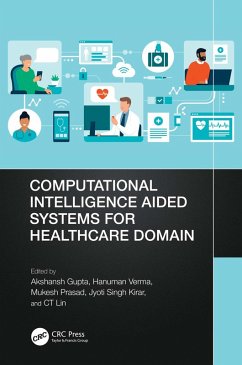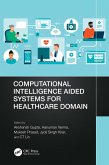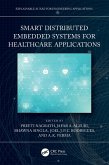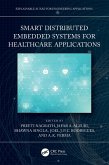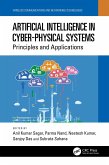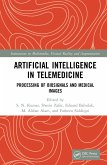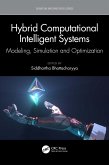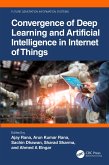Computational Intelligence Aided Systems for Healthcare Domain (eBook, ePUB)
Redaktion: Gupta, Akshansh; Lin, Ct; Singh Kirar, Jyoti; Prasad, Mukesh; Verma, Hanuman
51,95 €
51,95 €
inkl. MwSt.
Sofort per Download lieferbar

26 °P sammeln
51,95 €
Als Download kaufen

51,95 €
inkl. MwSt.
Sofort per Download lieferbar

26 °P sammeln
Jetzt verschenken
Alle Infos zum eBook verschenken
51,95 €
inkl. MwSt.
Sofort per Download lieferbar
Alle Infos zum eBook verschenken

26 °P sammeln
Computational Intelligence Aided Systems for Healthcare Domain (eBook, ePUB)
Redaktion: Gupta, Akshansh; Lin, Ct; Singh Kirar, Jyoti; Prasad, Mukesh; Verma, Hanuman
- Format: ePub
- Merkliste
- Auf die Merkliste
- Bewerten Bewerten
- Teilen
- Produkt teilen
- Produkterinnerung
- Produkterinnerung

Bitte loggen Sie sich zunächst in Ihr Kundenkonto ein oder registrieren Sie sich bei
bücher.de, um das eBook-Abo tolino select nutzen zu können.
Hier können Sie sich einloggen
Hier können Sie sich einloggen
Sie sind bereits eingeloggt. Klicken Sie auf 2. tolino select Abo, um fortzufahren.

Bitte loggen Sie sich zunächst in Ihr Kundenkonto ein oder registrieren Sie sich bei bücher.de, um das eBook-Abo tolino select nutzen zu können.
The text covers recent advances in artificial intelligence, smart computing, and their applications in augmenting medical and health care systems. It will serve as an ideal reference text for graduate students and academic researchers in diverse engineering fields including electrical, electronics and communication, computer, and biomedical.
- Geräte: eReader
- ohne Kopierschutz
- eBook Hilfe
- Größe: 15.03MB
Andere Kunden interessierten sich auch für
![Computational Intelligence Aided Systems for Healthcare Domain (eBook, PDF) Computational Intelligence Aided Systems for Healthcare Domain (eBook, PDF)]() Computational Intelligence Aided Systems for Healthcare Domain (eBook, PDF)51,95 €
Computational Intelligence Aided Systems for Healthcare Domain (eBook, PDF)51,95 €![Smart Distributed Embedded Systems for Healthcare Applications (eBook, ePUB) Smart Distributed Embedded Systems for Healthcare Applications (eBook, ePUB)]() Smart Distributed Embedded Systems for Healthcare Applications (eBook, ePUB)51,95 €
Smart Distributed Embedded Systems for Healthcare Applications (eBook, ePUB)51,95 €![Smart Distributed Embedded Systems for Healthcare Applications (eBook, PDF) Smart Distributed Embedded Systems for Healthcare Applications (eBook, PDF)]() Smart Distributed Embedded Systems for Healthcare Applications (eBook, PDF)51,95 €
Smart Distributed Embedded Systems for Healthcare Applications (eBook, PDF)51,95 €![Artificial Intelligence in Cyber-Physical Systems (eBook, ePUB) Artificial Intelligence in Cyber-Physical Systems (eBook, ePUB)]() Artificial Intelligence in Cyber-Physical Systems (eBook, ePUB)51,95 €
Artificial Intelligence in Cyber-Physical Systems (eBook, ePUB)51,95 €![Artificial Intelligence in Telemedicine (eBook, ePUB) Artificial Intelligence in Telemedicine (eBook, ePUB)]() Artificial Intelligence in Telemedicine (eBook, ePUB)116,95 €
Artificial Intelligence in Telemedicine (eBook, ePUB)116,95 €![Hybrid Computational Intelligent Systems (eBook, ePUB) Hybrid Computational Intelligent Systems (eBook, ePUB)]() Hybrid Computational Intelligent Systems (eBook, ePUB)51,95 €
Hybrid Computational Intelligent Systems (eBook, ePUB)51,95 €![Convergence of Deep Learning and Artificial Intelligence in Internet of Things (eBook, ePUB) Convergence of Deep Learning and Artificial Intelligence in Internet of Things (eBook, ePUB)]() Convergence of Deep Learning and Artificial Intelligence in Internet of Things (eBook, ePUB)51,95 €
Convergence of Deep Learning and Artificial Intelligence in Internet of Things (eBook, ePUB)51,95 €-
-
-
The text covers recent advances in artificial intelligence, smart computing, and their applications in augmenting medical and health care systems. It will serve as an ideal reference text for graduate students and academic researchers in diverse engineering fields including electrical, electronics and communication, computer, and biomedical.
Dieser Download kann aus rechtlichen Gründen nur mit Rechnungsadresse in A, B, BG, CY, CZ, D, DK, EW, E, FIN, F, GR, HR, H, IRL, I, LT, L, LR, M, NL, PL, P, R, S, SLO, SK ausgeliefert werden.
Produktdetails
- Produktdetails
- Verlag: Taylor & Francis
- Seitenzahl: 436
- Erscheinungstermin: 14. Juni 2023
- Englisch
- ISBN-13: 9781000884401
- Artikelnr.: 67886569
- Verlag: Taylor & Francis
- Seitenzahl: 436
- Erscheinungstermin: 14. Juni 2023
- Englisch
- ISBN-13: 9781000884401
- Artikelnr.: 67886569
Dr Akshansh Gupta is a scientist at CSIR-Central Electronic Engineering Research Institute Pilani Rajasthan. He has worked as a DST-funded postdoctoral research fellow as a principal investigator under the scheme of the Cognitive Science Research Initiative (CSRI) from the Department of Science and Technology (DST), Ministry of Science and Technology, Government of India, from 2016 to 2020 in School of Computational Integrative and Science, Jawaharlal Nehru University, New Delhi. He has many publications, including Springer, Elsevier, and IEEE Transaction. He received his master's and a PhD degree from the School of computer and systems sciences, JNU, in 2010 and 2015, respectively. His research interests include Pattern Recognition, Machine Learning, Data Mining Signal Processing, Brain Computer Interface, Cognitive Science, and IoT. He is also working as CO-PI on a consultancy project named "Development of Machine Learning Algorithms for Automated Classification Based on Advanced Signal Decomposition of EEG Signals" ICPS Program, DST Govt. of India. Dr Hanuman Verma received the PhD and M.Tech degrees in Computer Science and Technology from the School of Computer and Systems Sciences (SC&SS) at Jawaharlal Nehru University (JNU), New Delhi, India, in 2015 and 2010, respectively. He also did his master of Science (M.Sc.) degree in Mathematics & Statistics from Dr R. M. L. Avadh University, Ayodhya, Uttar Pradesh, India. He has worked as a junior research fellowship (JRF) and senior research fellowship (SRF) from 2009 to 2013, received from the Council of Scientific and Industrial Research (CSIR), New Delhi, India. Currently, he is working as Assistant Professor at the Department of Mathematics, Bareilly College, Bareilly, Uttar Pradesh, India. He has published research papers in reputed international journals, including Elsevier, Wiley, World Scientific, and Springer, in machine learning, deep learning and medical image computing. His primary research interest includes machine learning, deep learning, medical image computing, and mathematical modelling. Dr Mukesh Prasad (SMIEEE, ACM) is a Senior Lecturer in the School of Computer Science (SoCS), Faculty of Engineering and Information Technology (FEIT), University of Technology Sydney (UTS), Australia. His research expertise lies in developing new methods in artificial intelligence and machine learning approaches like big data analytics, and computer vision within the healthcare domain, biomedical research. He has published more than 100 articles, including several prestigious IEEE Transactions and other Top Q1 journals and conferences in the areas of Artificial Intelligence and Machine Learning. His current research interests include pattern recognition, control system, fuzzy logic, neural networks, the internet of things (IoT), data analytics, and brain-computer interface. He received an M.S. degree from the School of Computer Systems and Sciences, Jawaharlal Nehru University, New Delhi, India, in 2009, and a PhD degree from the Department of Computer Science, National Chiao Tung University, Hsinchu, Taiwan, in 2015. He worked as a principal engineer at Taiwan Semiconductor Manufacturing Company, Hsinchu, Taiwan, from 2016 to 2017. He started his academic career as a Lecturer with the University of Technology Sydney in 2017. He is also an Associate/Area Editor of several top journals in the field of machine learning, computational intelligence, and emergent technologies. Prof. Chin-Teng Lin Distinguished Professor Chin-Teng Lin received a Bachelor's of Science from National Chiao-Tung University (NCTU), Taiwan, in 1986, and holds Master's and PhD degrees in Electrical Engineering from Purdue University, USA, received in 1989 and 1992, respectively. He is currently a distinguished professor and Co-Director of the Australian Artificial Intelligence Institute within the Faculty of Engineering and Information Technology at the University of Technology Sydney, Australia. He is also an Honorary Chair Professor of Electrical and Computer Engineering at NCTU. For his contributions to biologically inspired information systems, Prof Lin was awarded Fellowship with the IEEE in 2005 and the International Fuzzy Systems Association (IFSA) in 2012. He received the IEEE Fuzzy Systems Pioneer Award in 2017. He has held notable positions as editor-in-chief of IEEE Transactions on Fuzzy Systems from 2011 to 2016; seats on the Board of Governors for the IEEE Circuits and Systems (CAS) Society (2005-2008), IEEE Systems, Man, Cybernetics (SMC) Society (2003-2005), IEEE Computational Intelligence Society (2008-2010); Chair of the IEEE Taipei Section (2009-2010); Chair of IEEE CIS Awards Committee (2022); Distinguished Lecturer with the IEEE CAS Society (2003-2005) and the CIS Society (2015-2017); Chair of the IEEE CIS Distinguished Lecturer Program Committee (2018-2019); Deputy Editor-in-Chief of IEEE Transactions on Circuits and Systems-II (2006-2008); Program Chair of the IEEE International Conference on Systems, Man, and Cybernetics (2005); and General Chair of the 2011 IEEE International Conference on Fuzzy Systems. Prof Lin is the co-author of Neural Fuzzy Systems (Prentice-Hall) and the author Neural Fuzzy Control Systems with Structure and Parameter Learning (World Scientific). He has published more than 400 journal papers, including over 180 IEEE journal papers in neural networks, fuzzy systems, brain-computer interface, multimedia information processing, cognitive neuro-engineering, and human-machine teaming, that have been cited more than 30,000 times. Currently, his h-index is 82, and his i10-index is 356.
Chapter 1
Introduction to Computational Methods-Machine and Deep Learning Perspective
Hanuman Verma, Akshansh Gupta, Jyoti Singh Kira, Mukesh Prasad, and C.T.
Lin
Chapter 2
Machine Learning Applications in Healthcare
Kushagra Krishnan, Sumit Kumar and Pinki Dey
Chapter 3
Deep Multi-view Learning for Healthcare Domain
Vipin Kumar, Bharti, Pawan Kumar Chaurasia and Prem Shankar Singh Aydav
Chapter 4
Precision Healthcare in the Era of IoT and Big Data: Monitoring of
Self-care Activities
Sujit Bebortta and Dilip Senapati
Chapter 5
Machine learning approach for classification of stroke patients using
clinical data
Rafiqul Islam and Bharti
Chapter 6
A Comparative Analysis of noise robust Fuzzy Clustering Algorithms for
Medical Image Segmentation
Inder Khatri, Dhirendra Kumar and Aaryan Gupta
Chapter 7
Exploring the role of AI, IoT and BC during Covid-19: A bibliometric and
network analysis
Parul Khurana and Kiran Sharma
Chapter 8
Biomedical Named Entity Recognition using Natural Language Processing
Shaina Raza, Syed Raza Bashir, Vidhi Thakkar and Usman Naseem
Chapter 9
Image segmentation of skin disease using deep learning approach
Manbir Singh and Maninder Singh
Chapter 10
Multimodality dementia detection system using machine and deep learning
Shruti Srivatsan, Sumneet Kaur Bamrah and K.S. Gayathri
Chapter 11
Heart Attack Analysis and Prediction System
Ashish Kumar Das, Ravi Vishwakarma, Adarsh Kumar Bharti, and Jyoti Singh
Kirar
Chapter 12
Utility of Exploratory Data Analysis for Improved Diabetes Prediction
Udita Goswami, Yashwaswa Verma, Anwesha Kar and Jyoti Singh Kirar
Chapter 13
Fundus Image Classification for Diabetic Retinopathy Using Deep Learning
Monika Mokan, Soharab Hossain Shaikh, Devanjali Relan and Goldie Gabrani
Chapter 14
Emerging role of Artificial intelligence in precision oncology
Vinod Kumar Singh
Chapter 15
Artificial Intelligence in Precision Oncology
Ranjeet Kaura, Sabiya Fatima, Amit Doegara, C. Rama Krishan and Suyash
Singh
Chapter 16
Computer-Aided Breast Cancer Diagnosis using Machine Learning and Deep
Learning methods: A Comprehensive Survey
Ritika Singh, Vipin Kumar, Prashant Prabhakar and Ibrahim Momin
Chapter 17
Complex dynamical interplay of health, climate and conflicts with data
driven approach
Syed Shariq Husain
Introduction to Computational Methods-Machine and Deep Learning Perspective
Hanuman Verma, Akshansh Gupta, Jyoti Singh Kira, Mukesh Prasad, and C.T.
Lin
Chapter 2
Machine Learning Applications in Healthcare
Kushagra Krishnan, Sumit Kumar and Pinki Dey
Chapter 3
Deep Multi-view Learning for Healthcare Domain
Vipin Kumar, Bharti, Pawan Kumar Chaurasia and Prem Shankar Singh Aydav
Chapter 4
Precision Healthcare in the Era of IoT and Big Data: Monitoring of
Self-care Activities
Sujit Bebortta and Dilip Senapati
Chapter 5
Machine learning approach for classification of stroke patients using
clinical data
Rafiqul Islam and Bharti
Chapter 6
A Comparative Analysis of noise robust Fuzzy Clustering Algorithms for
Medical Image Segmentation
Inder Khatri, Dhirendra Kumar and Aaryan Gupta
Chapter 7
Exploring the role of AI, IoT and BC during Covid-19: A bibliometric and
network analysis
Parul Khurana and Kiran Sharma
Chapter 8
Biomedical Named Entity Recognition using Natural Language Processing
Shaina Raza, Syed Raza Bashir, Vidhi Thakkar and Usman Naseem
Chapter 9
Image segmentation of skin disease using deep learning approach
Manbir Singh and Maninder Singh
Chapter 10
Multimodality dementia detection system using machine and deep learning
Shruti Srivatsan, Sumneet Kaur Bamrah and K.S. Gayathri
Chapter 11
Heart Attack Analysis and Prediction System
Ashish Kumar Das, Ravi Vishwakarma, Adarsh Kumar Bharti, and Jyoti Singh
Kirar
Chapter 12
Utility of Exploratory Data Analysis for Improved Diabetes Prediction
Udita Goswami, Yashwaswa Verma, Anwesha Kar and Jyoti Singh Kirar
Chapter 13
Fundus Image Classification for Diabetic Retinopathy Using Deep Learning
Monika Mokan, Soharab Hossain Shaikh, Devanjali Relan and Goldie Gabrani
Chapter 14
Emerging role of Artificial intelligence in precision oncology
Vinod Kumar Singh
Chapter 15
Artificial Intelligence in Precision Oncology
Ranjeet Kaura, Sabiya Fatima, Amit Doegara, C. Rama Krishan and Suyash
Singh
Chapter 16
Computer-Aided Breast Cancer Diagnosis using Machine Learning and Deep
Learning methods: A Comprehensive Survey
Ritika Singh, Vipin Kumar, Prashant Prabhakar and Ibrahim Momin
Chapter 17
Complex dynamical interplay of health, climate and conflicts with data
driven approach
Syed Shariq Husain
Chapter 1
Introduction to Computational Methods-Machine and Deep Learning Perspective
Hanuman Verma, Akshansh Gupta, Jyoti Singh Kira, Mukesh Prasad, and C.T.
Lin
Chapter 2
Machine Learning Applications in Healthcare
Kushagra Krishnan, Sumit Kumar and Pinki Dey
Chapter 3
Deep Multi-view Learning for Healthcare Domain
Vipin Kumar, Bharti, Pawan Kumar Chaurasia and Prem Shankar Singh Aydav
Chapter 4
Precision Healthcare in the Era of IoT and Big Data: Monitoring of
Self-care Activities
Sujit Bebortta and Dilip Senapati
Chapter 5
Machine learning approach for classification of stroke patients using
clinical data
Rafiqul Islam and Bharti
Chapter 6
A Comparative Analysis of noise robust Fuzzy Clustering Algorithms for
Medical Image Segmentation
Inder Khatri, Dhirendra Kumar and Aaryan Gupta
Chapter 7
Exploring the role of AI, IoT and BC during Covid-19: A bibliometric and
network analysis
Parul Khurana and Kiran Sharma
Chapter 8
Biomedical Named Entity Recognition using Natural Language Processing
Shaina Raza, Syed Raza Bashir, Vidhi Thakkar and Usman Naseem
Chapter 9
Image segmentation of skin disease using deep learning approach
Manbir Singh and Maninder Singh
Chapter 10
Multimodality dementia detection system using machine and deep learning
Shruti Srivatsan, Sumneet Kaur Bamrah and K.S. Gayathri
Chapter 11
Heart Attack Analysis and Prediction System
Ashish Kumar Das, Ravi Vishwakarma, Adarsh Kumar Bharti, and Jyoti Singh
Kirar
Chapter 12
Utility of Exploratory Data Analysis for Improved Diabetes Prediction
Udita Goswami, Yashwaswa Verma, Anwesha Kar and Jyoti Singh Kirar
Chapter 13
Fundus Image Classification for Diabetic Retinopathy Using Deep Learning
Monika Mokan, Soharab Hossain Shaikh, Devanjali Relan and Goldie Gabrani
Chapter 14
Emerging role of Artificial intelligence in precision oncology
Vinod Kumar Singh
Chapter 15
Artificial Intelligence in Precision Oncology
Ranjeet Kaura, Sabiya Fatima, Amit Doegara, C. Rama Krishan and Suyash
Singh
Chapter 16
Computer-Aided Breast Cancer Diagnosis using Machine Learning and Deep
Learning methods: A Comprehensive Survey
Ritika Singh, Vipin Kumar, Prashant Prabhakar and Ibrahim Momin
Chapter 17
Complex dynamical interplay of health, climate and conflicts with data
driven approach
Syed Shariq Husain
Introduction to Computational Methods-Machine and Deep Learning Perspective
Hanuman Verma, Akshansh Gupta, Jyoti Singh Kira, Mukesh Prasad, and C.T.
Lin
Chapter 2
Machine Learning Applications in Healthcare
Kushagra Krishnan, Sumit Kumar and Pinki Dey
Chapter 3
Deep Multi-view Learning for Healthcare Domain
Vipin Kumar, Bharti, Pawan Kumar Chaurasia and Prem Shankar Singh Aydav
Chapter 4
Precision Healthcare in the Era of IoT and Big Data: Monitoring of
Self-care Activities
Sujit Bebortta and Dilip Senapati
Chapter 5
Machine learning approach for classification of stroke patients using
clinical data
Rafiqul Islam and Bharti
Chapter 6
A Comparative Analysis of noise robust Fuzzy Clustering Algorithms for
Medical Image Segmentation
Inder Khatri, Dhirendra Kumar and Aaryan Gupta
Chapter 7
Exploring the role of AI, IoT and BC during Covid-19: A bibliometric and
network analysis
Parul Khurana and Kiran Sharma
Chapter 8
Biomedical Named Entity Recognition using Natural Language Processing
Shaina Raza, Syed Raza Bashir, Vidhi Thakkar and Usman Naseem
Chapter 9
Image segmentation of skin disease using deep learning approach
Manbir Singh and Maninder Singh
Chapter 10
Multimodality dementia detection system using machine and deep learning
Shruti Srivatsan, Sumneet Kaur Bamrah and K.S. Gayathri
Chapter 11
Heart Attack Analysis and Prediction System
Ashish Kumar Das, Ravi Vishwakarma, Adarsh Kumar Bharti, and Jyoti Singh
Kirar
Chapter 12
Utility of Exploratory Data Analysis for Improved Diabetes Prediction
Udita Goswami, Yashwaswa Verma, Anwesha Kar and Jyoti Singh Kirar
Chapter 13
Fundus Image Classification for Diabetic Retinopathy Using Deep Learning
Monika Mokan, Soharab Hossain Shaikh, Devanjali Relan and Goldie Gabrani
Chapter 14
Emerging role of Artificial intelligence in precision oncology
Vinod Kumar Singh
Chapter 15
Artificial Intelligence in Precision Oncology
Ranjeet Kaura, Sabiya Fatima, Amit Doegara, C. Rama Krishan and Suyash
Singh
Chapter 16
Computer-Aided Breast Cancer Diagnosis using Machine Learning and Deep
Learning methods: A Comprehensive Survey
Ritika Singh, Vipin Kumar, Prashant Prabhakar and Ibrahim Momin
Chapter 17
Complex dynamical interplay of health, climate and conflicts with data
driven approach
Syed Shariq Husain
